The incredible journey of Ram Singh, indentured no. 120323
From indentured worker to business owner
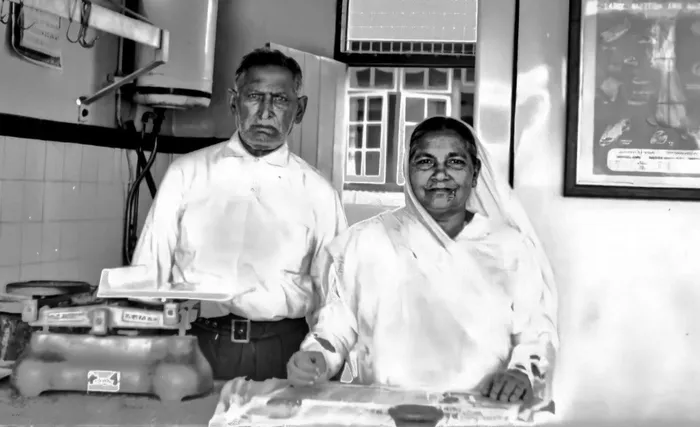
Ramsing and Ramdulary in the butcher shop
Image: Supplied
IT OFEN takes a few generations for descendants to fully reap the benefits of the sacrifices of their ancestors. In the case of Dr Boopsingh Ramsing, it took just one generation for his family to completely alter the lifestyle trajectory of their indentured descendants for generations to come.
Eighty-five-year-old Dr Boopsingh Ramsing is the youngest son of Ram Sing and Ramdulary Sing. A first-generation descendant, Dr Boopsingh places himself in a unique category of being perhaps the world’s fewest, if not the only living, children of indentured workers in the former colony of Natal, given that the system of indentured labour bondage ended in South Africa by 1911.
Dr Boopsingh’s father, Ram Sing, indentured number 120323, was registered as an indentured migrant at Agra in India, to disembark from the port city of Calcutta on the SS Umlazi in April 1906. An interesting part of the Umlazi register revealed that Sanskrit-speaking Ram Sing, who hailed from the Gwalior District, with many of his male friends, were listed as part of the 3.4% Thakur caste that, according to Professor Surendra Bhana, had come to South Africa from 1860 to 1902.
The list of ship passengers alongside Ram Sing corroborates the testimony of Dr Boopsingh Ramsing, narrated to him by his father, explaining that his indentured recruitment to Natal was a result of an angry family dispute. The dispute centred around a lost family letter on a horseback journey from Gwalior to Kasganj, which resulted in Ram Sing opting to be recruited to Natal after seeing a pamphlet that extolled the benefits of indentured labour recruitment to former imperial colonies.
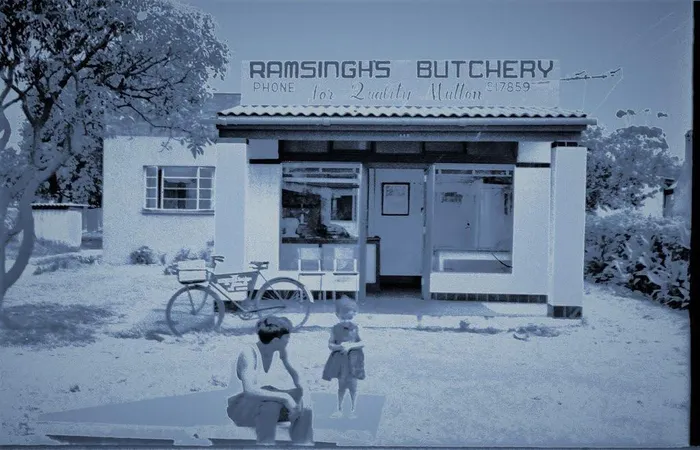
The butcher shop.
Image: Supplied
The peculiar nature of Ram Sing’s indentured recruitment to Natal debunks the coercive myth of indenture and that only workers from the lower castes were recruited to the colonies. Dr Boopsingh Ramsing’s oral testimony of his father’s life is extraordinarily rare, given that the last body of work focused on the oral testimony of indentured workers was done in the 1980s and archived as the Roots Projects listed on the University of KwaZulu-Natal’s Gandhi-Luthuli archive repository, supervised by Bhana and then lecturer Uma Dhupelia-Mestrie.
Those indentured workers made up a cohort of workers who arrived in South Africa in the last two decades of the 19th century, and whose lives were better understood because of this incredible resource. Before this, the phenomenal field research interviews by Hilda Kuper in her seminal publication titled Indian People in Natal and Professor Fatima Meer’s publication, The Portrait of Indian South Africans, form rare examples of oral testimony written in the 1960s.
These experiences of indentured workers who came to South Africa from 1860 up to 1872 when the first commission – the “Coolie Commission” – was completed, exposed the lived experiences of workers to a wider audience. In the case of Ram Sing, we get a sense of the lives of those workers who arrived at the start of the 20th century. Ram Sing was indentured to Kimber, Percy Dixon Monkdale of Dargle, Howick, when he arrived in 1906. His first indentured contract ended in 1911 when he then applied for a second indenture, being employed by J Tomlinson in Ixopo.
After completing this contract, he returned to Umzinto in 1916, where he was indentured on a neighbouring farm to the Reynolds brothers.
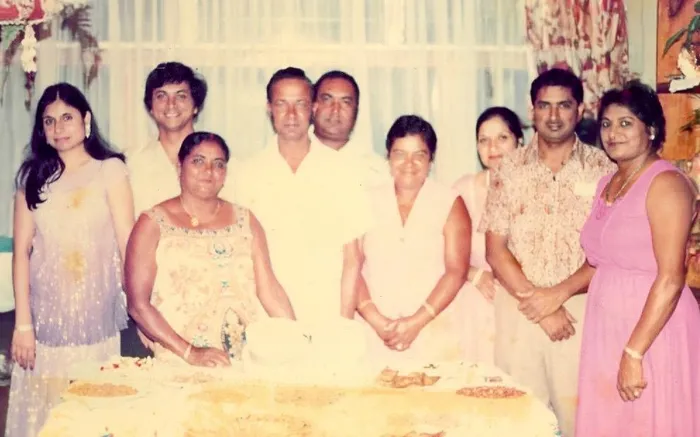
The children and partners of Ram Sing and Ramdulary Sing.
Image: Supplied
On this farm, Ram Sing completed his indentured contract to work on the Umbelibeli Farm, where they leased plots of land, growing vegetables for market gardening. It was here that Ram Sing met his colonial-born wife, Ramdulary Singh, whose parents, Nagiashar and Sahodoree Singh, arrived much earlier, in 1883, in Natal from India.
The 36-year-old Ram Sing married 16-year-old Ramdulary in 1921, in Umzinto. By 1935, Ram and Ramdulary Sing with their four children, Ramdulary’s parents, and the entire Singh family clan moved to Clairwood, where Boopsingh, the last child of the Sings, was born in 1940. The family moved to a rented property in Jacobs Road, from where Ram Sing worked as a market gardener, travelling on foot, carrying vegetables in his trusty cane wicker basket, and selling them in Wentworth.
By the time Boopsingh was 5 years old, he was accompanying his father on his walkabouts. In a short time and with enough money saved, Ram Sing purchased a property on Dayal Road, Clairwood. By then, many members of the Ramdulary Singh clan had also owned property, signifying a rapid rise from indentured workers in Umzinto to property owners in Clairwood.
Ram Sing built a two-bedroomed wood-and-iron home and a shop in front of the house. From here, he began cultivating rice and other vegetables on marshy land, and opened a small butcher shop using a damaged fridge.
Over time, “Ramsingh’s Butchery” became a prominent business in the area, managed by the entire family.In a few years, Ramsingh’s Butchery expanded into a fully-fledged operation with an industrial fridge, becoming one of four butchers selling meat to the entire neighbourhood of Clairwood. The success of the business saw the entire family working in the store, with their weekends being insanely busy, requiring them to work long hours to assist the business
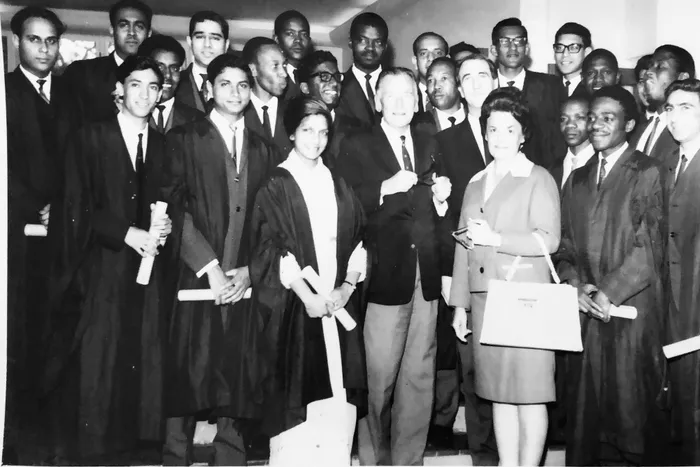
Dr Boop Ramsingh (second from left in the front row) at his graduation.
Image: Supplied
In line with the rapid success of their father, Ram Sing’s children also started to flourish, with two sons being able to go to school while the eldest son, Beharie Ramsing, a classical pianist of the highest calibre, maintained the family butcher shop in Dayal Road. Their sister, Phoolmathie Ramsing worked in local clothing factories, helping to support her family. Deomathie Ramsing, who was raised by her maternal aunt, Sukhia, became a successful businesswoman who owned multiple properties and shops in Dayal Road, eventually becoming a popular and well-respected tour guide.
Boopsingh and his brother, Lalsingh Ramsing, a classmate of high court judge and Struggle activist Thumba Pillay, and the school principal of the author of this article at Woodhurst Secondary in Chatsworth, went from studying at the makeshift primary school located at Clairwood Graveyard to the prestigious Clairwood High School and Sastri College, where both ended up regularly finishing in the top 10 of their classes.Boopsingh Ramsing eventually became the dux of Clairwood High School, a year after UN commissioner Judge Navanetham Pillay occupied the same position.
Boopsingh Ramsing’s meteoric rise saw him earn a scholarship to study medicine at the University of Natal, qualifying as a medical doctor in 1967. Due to racial salary disparities under apartheid, he resigned from practising clinical medicine in 1969. In 1970, he joined the Department of Physiology at Durban Medical School as a lecturer in biochemistry. During his tenure, he taught many future leaders, including Steve Biko and Nkosazana Dlamini-Zuma. In 1972, he was awarded the prestigious Nuffield Dominion Scholarship to Oxford University in the UK, to a short stint in private practice, eventually becoming a doctor specialising in radiology.
Toward the end of his studies, in 1966, his father, Ram Sing, passed away in St Aidan’s Hospital at the age of 81, having risen from an indentured worker to a hugely successful business owner, thankfully being able to see his progeny also succeed in just one generation.
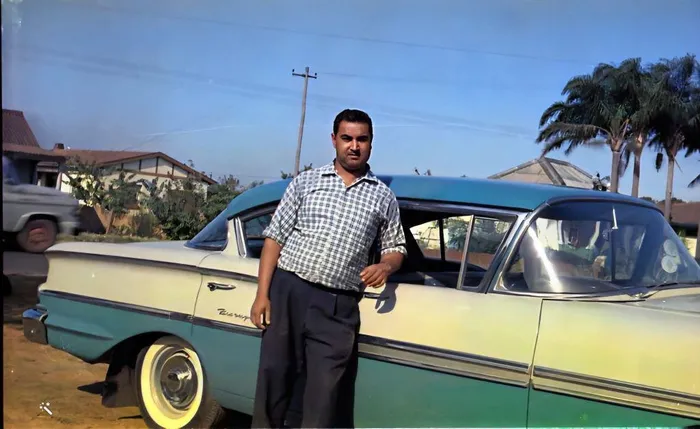
Beharie Ram Sing, a classical pianist, standing alongside side his classic car in the 1960s.
Image: Supplied
Dr Boopsingh Ramsing’s oral testimony, which has been recorded as part of the 1860 Heritage Centre’s archival interviews on the life of indentured workers, told by a son, provides fresh insight against the grain of traditional archival references we source in trying to understand the life of the indentured workers.
In the same vein of the testimony of Totaram Sanadhya, Munshi Rahman Khan, Baba Ramchandra, Bhawani Dayal Sannyasi, Benarsidas Chaturvedi, the journal of Captain and Mrs Swinton, and the diary entries of the Umona ship captain Max de Gruyter recorded in the book, the Indian Africans, Dr Boopsingh Ramsing’s testimony provides incredibly valuable insight on the movements, lives and afterlives of 152 184 indentured workers who came to South Africa from 1860 to 1911.
The incredible agency and resilient rise of indentured workers in creating a home away from home to build modern economies all across the New World, like those in the mould of Ram Sing, must be told alongside the brutal violence and oppression they endured in the system of indenture. Indentured Ram Sing’s success speaks to the incredible triumph of the human spirit that sowed seeds of a better life for generations to come.
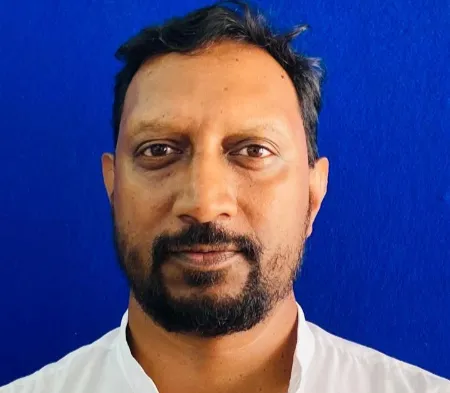
Selvan Naidoo
Image: File
Selvan Naidoo is the Director of the 1860 Heritage Centre.
Related Topics: